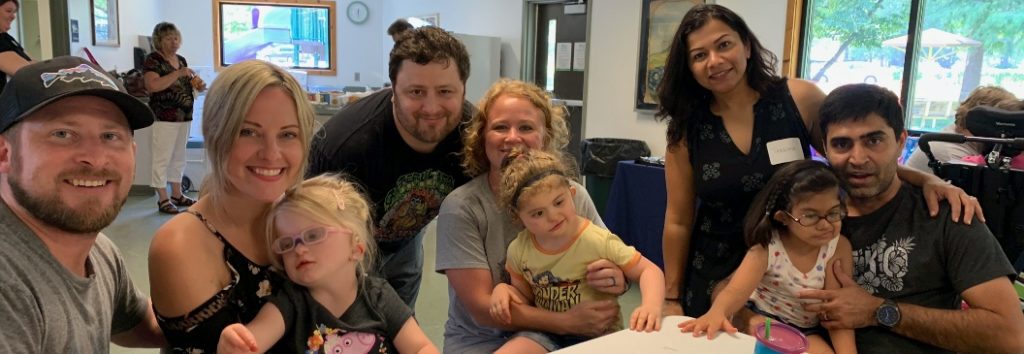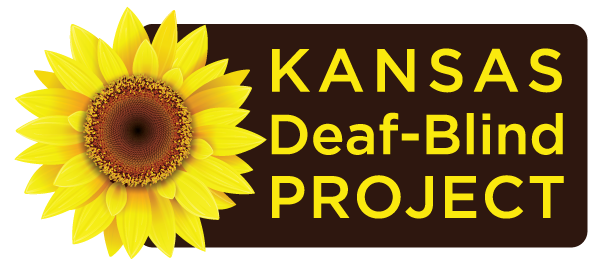For Families
 The first step in being eligible to receive services is registering a child with combined hearing and vision loss, ages birth to 21, with the KSDB Project. A parent or a school team member may register a child by completing the online application form. A pdf version is also available under forms on the Resources page.
The first step in being eligible to receive services is registering a child with combined hearing and vision loss, ages birth to 21, with the KSDB Project. A parent or a school team member may register a child by completing the online application form. A pdf version is also available under forms on the Resources page.
For family engagement activities and support, please contact our Family Engagement Coordinator:
Lisa Collette at lcollette@kssdb.org.
Kansas Deaf-Blind Project Services Offered to Families:
A limited number of parent scholarships is available each year to assist parents in attending conferences or training relevant to their child’s disability. To apply for a scholarship, please complete the Application for Family Scholarships.
(Supporting Parent Access to Resources Knowledge, Linkages and Education) – A program for individualized learning that helps families be better advocates for their child.
The SPARKLE training teaches the following topics: deaf-blindness, vision, hearing, touch, concept development, intervention, communication. Please contact the KSDB Project if interested in the training.
Annual Family Day is a networking event for our families to foster a community of support.
Parents Encouraging Parents – Foster a community of support for parents and families of children and young adults with combined hearing and vision loss (deaf-blind), facilitated by two parent liaisons with a child who is deaf-blind.
Discover CVI Online Parent Group is a place for families to connect and share ideas, information, and resources about Cortical Visual Impairment. If you are a parent of a child with CVI and are interested in joining this group, please register here.
Music and Me (children birth to 5) – is an online activity for parents and children ages birth to five with visual impairments or combined hearing and vision loss (deaf-blind). We will use music therapy to facilitate positive and fun activities that may be used in other settings, encourage socialization, motor development, and relaxation, provide a bonding experience for parent and child, and introduce strategies to support communication and exploration.
Family to Family Communities (F2FC) – This group is a collaborative effort among the National Family Association for Deaf-Blind (NFADB), the National Center on Deafblindness (NCDB), and State Deaf-Blind Projects. F2FC offers families a platform to connect and share support by sharing information and resources and just being present to listen and understand the challenges and triumphs of raising a child with deaf-blindness
Mission Statement:
Committed to providing a safe place for parents to connect and share ideas, information, and resources about Cortical Visual Impairment.
Vision:
To foster a community of support for families with a child with Cortical/Cerebral Visual Impairment.
About Discover CVI:
- Inspired by parents searching for more information about CVI, seeking ways to help their child
- Facilitated by two-parent leaders with a child with CVI.
- Two teachers of students with visual impairments are available to provide input as needed.
- Meets online every 4th Tuesday of each month for an hour (starting at 7:30 pm) on various topics and periodic meet and greets (except holidays).
- Contents of the sessions are not limited to parent support and parent education, guest speaker, and/or video/webinar presentations based on parent interest community resources.
Discover CVI Guidelines:
Each member must abide by the guidelines set forth by the KS Deaf-Blind Project, which are:
- Everyone is treated with respect.
- Personal information discussed in this group is confidential.
- Information from the support group is not intended to replace professional or medical advice.
- Discover CVI is not an advocacy group. This platform is not to be used for any lobbying for change in schools/districts or state policies or to advance an individual cause.
The contents of the presentations in meetings were developed under a grant from the U.S. Department of Education #H326T180051. However, those contents do not necessarily represent the U.S. Department of Education policy, and you should not assume endorsement by the Federal Government.
The Kansas State School for the Blind (KSSB) and Kansas Deaf-Blind Project’s (KSDB) sponsorship does not imply endorsement of a particular philosophy, product, or procedure. Discussions or materials presented at this meeting reflect participants’ views for educational and informational purposes only and not as professional advice for specific cases or circumstances by KSSB/KSDB Project.
Expanded Core Curriculum (ECC) Resources for Parents
Transition planning helps students with deaf-blindness prepare for life after high school. Kansas requires transition services to be included in the student‘s IEP beginning at the age of 14. It is helpful to have Person-Centered Planning completed to support the process.
Because learners with deaf-blindness often have complex needs, it is recommended to start the transition plans earlier. It is a collaboration between the student, family, educational team, and adult services such as vocational rehabilitation and other relevant agencies. It is essential to include a transition planning team member who has a strong understanding of deaf-blindness.
Beyond formal transition planning, preparation for adult life really begins much earlier in a child’s life with activities that promote self-determination, establish community connections, and build skills that are needed for future employment and lifelong learning. (https://www.nationaldb.org/info-center/educational-services/transition-planning/)
The Kansas Deaf-Blind Project offers the following resources to support your child, family, and the educational team at no cost.
- Conduct Person-Centered Planning utilizing Charting the LifeCourse Framework or MAPS (Making Action Plans) to develop a vision for a good life for the student (your child with deaf-blindness); identify or develop supports, and explore what it takes for the student or family to live the good life you envision for the student. The KSDB Project offers Person-Centered Planning in any stage of the student’s life: early childhood, school-age, and transition to adulthood. Request for Person-Centered Planning here.
- Connect the family and school team to our partner agencies for additional services or information: Helen Keller National Center, Kansas State School for the Blind, Kansas School for the Deaf, Families Together.
- Recorded webinars and training on pertinent topics.
- Provide related information requested by the family or educational team.
Usher Syndrome
- If your child has Usher Syndrome, contact William Wilkerson at ambassador.ks@usher-syndrome.org. William is the Kansas Ambassador for the Usher Syndrome Coalition.
Additional Programs/Services:
Supporting You is a statewide support/mentorship program to connect Kansas families with other Kansas families raising children with special needs and need a lending ear. Supporting You is created by the Special Health Services Family Advisory Council (SHS-FAC).
Families Together – Families Together, Inc. is a nonprofit organization serving children and youth with disabilities throughout the state of Kansas. Families Together, Inc. also serves as the Parent Training and Information Center for Kansas.
Helen Keller National Center, Great Plains Regional Office – The HNKC Great Plains Regional Offices bring HKNC resources to you. The regional representative knows all about the programs and services available to deaf-blind individuals, their families, and service providers in each state and beyond and can help individuals find and access the right ones. For more information, contact: Beth Jordan, M.Ed., CRC.
Email: beth.jordan@hknc.org Voice: 913-677-4562 VP: 913-227-4282
CVI RESOURCES:
CVI: A Fact Sheet for Families and Professionals, Christopher Russell
CVI Connect presentation: Literacy Through the CVI Lens, Just a Beginning
August 2021- Explanation of CVI overlay followed by demonstrations and examples of each characteristic. Includes recording of phonemic awareness assessment and demonstration of Elkonin boxes. Resource list at end.
CVI Now
Extensive information about CVI for parents and professionals
CVI Resource
Dr. Christine Roman-Lantzy’s CVI Resources website; it includes information for families and professionals.
CVI Scotland
Step1: Understanding CVI
Step 2: Assessing CVI
Step 3: Supporting CVI
Paths to Literacy – Tips on Using a CVI Overlay in a Child’s School Day
posting by Charlotte Cushman; reposted 4/2022
Pediatric Visual Impairment Society (PCVIS) blog – Phonemic Awareness: Having Fun with Sounds
December 4, 2019
Perkins CVI – classes and webinars
E-learning classes, free archived webinars, CVI for the
TVI webinars
Roman on CVI
18 videos on CVI and The CVI Range developed by
Christine Roman-Lantzy, Ph.D.
